Theater Reviews: The State of the Union
Artists should “no longer huddle in the confines of a painted box set” but instead join together to “find visible and audible expression for the tempo and psychology of our time” and dramatize “the search of the average American today for knowledge about his country and his world.” – Hallie Flanagan, Federal Theatre Project
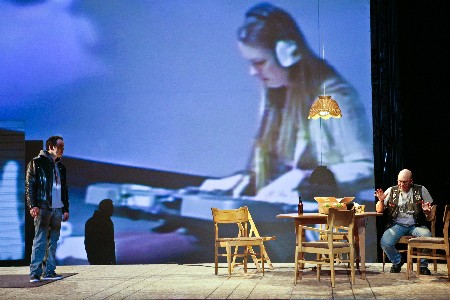
The Video Image Loometh: A scene with Karl Bury and Thomas Derrah in Clifford Odets's Paradise Lost at the American Repertory Theater. Photo credit: Marcus Stern
Stick Fly by Lydia Diamond. Directed by Kenny Leon. Presented by the Huntington Theatre Company in collaboration with the Arena Stage at the Virginia Wimberly Theatre at the Boston Center for the Arts, through March 28.
Paradise Lost by Clifford Odets. Directed by Daniel Fish. Staged by the American Repertory Theater at the Loeb Drama Center, Cambridge, MA, through March 20.
The Book of Grace by Suzan-Lori Parks. Directed by James Macdonald. At the Public Theater, New York, NY, through April 4.
Reviewed by Bill Marx
Doing away with a “painted box set” does not necessarily free up our theater artists to provide compelling “visible and audible expression” of the cultural and political spirit of the present day.
In fact, given the depressing dependence on multimedia folderol in both The Book of Grace by Suzan-Lori Parks and director Daniel Fish’s tricked up production of Clifford Odets’s Paradise Lost at the American Repertory Theater (ART), the evidence runs in the opposite direction.
The addition of technology seems to ratchet up a compensatory dramatic hysteria, pumping up a production’s urge to float a bloated Important Message. The savvy modesty of Stick Fly‘s comic meditation on race and class, presented in a non-videoized but well-designed set, comes as a funny, perceptive, and reassuring testament to the values of the provisional, on stage and off.
Current attempts to turn the stage into a giant TV screen seem to be part of an effort to reassure theatergoers that theater can be morphed into a new-fangled CGI movie (or into a disco party, The Donkey Show, or into an impressive arts installation, Sleep No More, earlier ART productions under the new “show ‘em its not just theater” leadership of Diane Paulus). The mania for the projected image wreaks havoc on the ART’s staging of Paradise Lost, an Odets epic that had a debilitating case of The Big Statement when it hit Broadway in 1935.
After the critical success of the one-act Waiting for Lefty, Odets was pushed to write more and more ambitious plays, but he lacks the talent for sustained dramatic construction—the lumpy, speechifying Paradise Lost earned Odets his first round of negative reviews, helping to send him away from the theater to Hollywood, where his talent for juicy dialogue and simmering visions of personal and public betrayal fit well (sometimes brilliantly, as in “Sweet Smell of Success”) into pre-fab movie formulas.
Paradise Lost is the de-evolutionary tale of a middle-class, American family, the Gordons. The Depression cleans out its bank account and eventually its home. On the way down, the Gordons grapple with the loss of life as well as with failed dreams of athletic success, artistic accomplishment, brotherly love, and financial security. Clara, the pragmatic wife, plays second banana to delusional merchant hubby Leo, who throughout the descent into poverty maintains his radical faith in the American Dream.
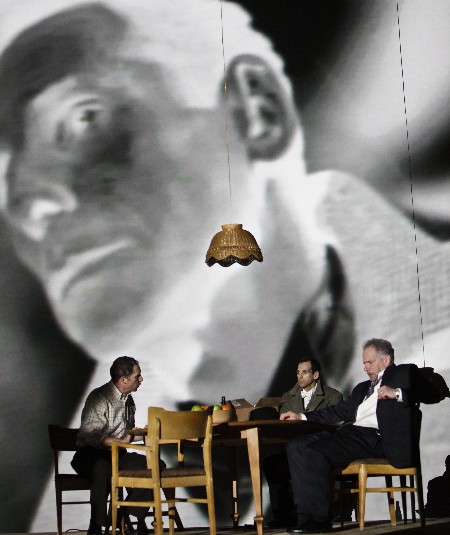
David Chandler, T. Ryder Smith, Jonathan Epstein and giant video spirit in Paradise Lost. Photo: Marcus Stern.
The script’s leftist politics generally serve as talky window dressing: when Odets confronts idealistic Leo with real world complications, such as how to provide better working conditions for the mistreated workers in his shop (we are asked to believe the old line that he didn’t know about the exploitation), the matter is dropped. But that is Odets’s scattershot approach throughout—even the major villain of the piece hasn’t the integrity of his own greed. Odets has him come on guilt-ridden at the end, offering the Gordons blood money just so the family, without a penny to its name, can honorably shame him.
Not content with that feel-good moment, the playwright struggles to provide a mega-inspirational final message: Leo’s oracular response to the nihilistic dressing down of a tramp Marxist. As amusing as it is to hear a ringing defense of Ralph Waldo Emerson (!) in the face of a communist lambasting, the mishmash suggests that the Gordons, despite Odets’s speeches to the contrary, remain out of touch with reality.
The playwright’s jump to Hollywood suggests that he saw the real value of escapism: critic George Jean Nathan opined that Leo delivers “such a lush panegyric to the future bliss of mankind as makes the ordinary happy ending of the commercial Broadway drama look like the finish of Othello.”
Still, Paradise Lost offers some of the crackling energy and slangy dialogue that makes even Odets in ersatz-Chekhovian mode fun to sit through. And the ART production will most likely be the only professional staging of the large cast Paradise Lost we will have the opportunity to see. But, obsessed with making sure the audience sees the “relevance” of the play, director Fish ladles on the giant video shots, TV commercials, hand-held mikes, and electric pianos. The result of the modern airbrushing is to make the play seem more, not less, dated. The abstract set is so barren that it defeats the message of the play: the Gordons have nothing to lose as they sink into terminal debt.
The performances feel under done and earnest, the cast members making too little hay of the roller-coaster rhythms in Odets’s language, the kitschy patter of desires thwarted and dreams denied. The dramatist’s characters may be lost and broken, but their tongues are lively. T. Ryder Smith provides a standout turn as Mr. May, a professional arsonist who offers to set fire to Gordon’s shop for the insurance money—the performer offers a creepily conversational note of unrepentant evil, no preaching but a plain old invitation to despicable action. Jonathan Epstein offers some corrosive moments of capitalist self-hatred as the bedeviled Sam Katz, Leo’s tortured business partner.
The Book of Grace
You don’t have to have lived in the 1930s to write a play that could have crawled out of the didactic depths of the era. Receiving its world premiere at New York’s Public Theater, The Book of Grace is a bewildering paradox—Pulitzer-Prize-winning playwright Suzan-Lori Parks takes on a fascinating topic, the roots of domestic terrorism, but the script’s allegorical world, populated by cartoony victims and victimizers, turns out to be just as dated as Odets’s soapbox universe, sans philosophical Marxists. Another play sporting a Big Statement collapses under its own portentous weight.
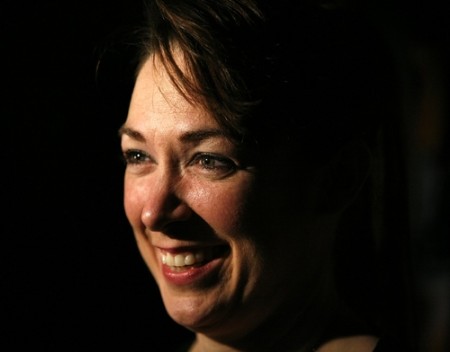
Actress Elizabeth Marvel plays the title character in The Book of Grace. Photo: Walter McBride
Set in South Texas, the simple-minded yarn revolves around the domestic arrangements of a border patrol guard, imaginatively named Vet, who is about to receive a medal for his gung-ho success at keeping illegal aliens out of the U.S. Vet conforms to just about every right-wing brute cliché: he’s xenophobic, violent, narcissistic, authoritarian, and homicidal. Vet abuses his hapless saint of a wife, Grace (a hole in the backyard patiently awaits her dead body once she crosses him once too often) and he believes Buddy, his son (whom he sexually molested, naturally) from his first marriage to be a bad seed. Meanwhile, the artsy Grace is forced to hide under the living room rug her “Book of Grace,” a collection of candied and cutesy observations, down home stories, and opinions, including a shout-out to Barack Obama. The hubby from Hell does not approve of self-expression.
Buddy comes home after a decade-long absence and, along with trying to curry favor with a suspicious dad, swears (often) that he will have his vengeance. Since Grace and Buddy hook-up carnally on the couch the moment they meet, the inevitability of an explosion is guaranteed. Buddy, who soon nicknames himself Snake after his father, relates his terror plans to a video camera, his anger springing less from political perfidy or the crushing tax burden (though he quotes the U.S. Constitution a lot) than from his tortured relationship with this insane father, whom he wants to please as well as pulverize.
The ambiguity of Parks’s best plays, her lyrical manipulations of myth and the American dream, leaves the audience guessing fruitfully. The characters in The Book of Grace are one-dimensional, liberal tinker toys—will Grace survive among the murderous Snakes in the Texas grass?—so the play doesn’t work as incisive political drama or as compelling domestic saga. The symbolic fate of Grace is left in no prosaic doubt; in fact, it is hard to keep a straight face at the rabbit-out-of-a-hat resolution.
The performers reflect the ambitious fuzziness of the script, with John Doman, as Vet, left with nothing to do but preen militarily and glare with menace—he lives his job. As Grace, Elizabeth Marvel is stuck with a misguided role that calls for her to be an inspirational salt-of-the-earth dishrag. The woman is independent enough to defy Vet with her writings, yet she is unable to conceive of leaving the murderous goon and inanely optimistic that Buddy and Vet will be able to patch up their broken relationship. As Buddy, Amari Cheatom never really evokes the despairing, eruptive center of Buddy— somehow the performer has to be craven, yet threatening at the some time. Cheatom ends up being neither—his plans for domestic terrorism come off as the fruits of a temper tantrum.
Of course, director James Macdonald piles on the video with a vengeance: not only prolonged projections of Buddy’s rants into the camera, but the backdrop of Vet’s manse is a video projection that erupts into flames and other knee-jerk visual reflections of the psychological goings-on. I have admired a number of Parks’s earlier scripts, from The America Play and Topdog/Underdog to Venus, so this play and production, which I saw during previews, was dispiriting. Parks was in the audience taking notes, obviously considering making changes. I wish her luck adding heft to this thin fable of American dysfunction—she will need it.
Stick Fly
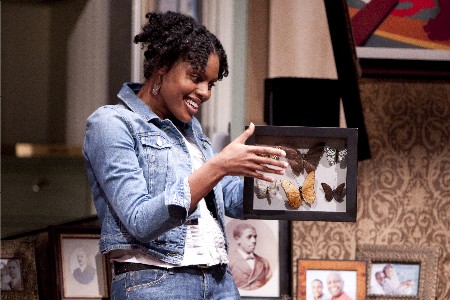
Nikkole Salter as Taylor in the Huntington Theatre Company's production of Stick Fly. Photo: Scott Suchman
Perhaps the best way to dramatize American turmoil may be to stay away from the neon-lit (or video-lit) “State of the Union” messages of Paradise Lost and The Book of Grace. Stick Fly by Lydia Diamond explores issues of race and class by reaching back to the 1930s, but she stays well away from the period’s ideals of kinship and public spiritedness espoused with such a heavy touch by Odets and Parks. Instead, she draws on the well-heeled comedy of manners of Philip Barry, cross-fertilizing it with the sprightly social combativeness of Wendy Wasserstein and the one-liner friskiness of TV sitcoms.
The result is a smart, entertaining evening that in its relaxed way does just what Hallie Falangan asks that contemporary drama should do—provide a vibrant picture of “the tempo and psychology of our time,” emphasizing some of the thornier conflicts within the African-American community. Diamond shuffles her clashing characters and their non-stop power plays and verbal confrontations with well-timed dexterity, aided by energetic performances from the cast under the sharp direction of Kenny Leon. At times the proceedings lapse into the lazy predictability of sitcom, but there’s enough observant grit to keep Stick Fly above that level most of the time.
The setting is the Martha’s Vineyard vacation home of the wealthy African-American LeVay family. Patriarch Joe is a famed neurosurgeon: he is happy with the career of one son, Flip, a successful plastic surgeon who shares his father’s libertine ways with women; he is much less happy with Kent, who has decided, after much struggle, to become a writer. It is time for the summer family gathering, and both siblings have brought home women for Mom and Dad’s approval: Kent is in love with Taylor, a feisty and brilliant woman who studies flies and, coming from a dysfunctional African-American family, has some painful issues with father figures. Flip is seeing Kimber, a confident white woman who deals with the urban underprivileged.
Matriarch LeVay never shows up at the vacation home, an absence connected with the issues raised by the maid’s daughter, who makes some shocking discoveries while taking over Mom’s duties. The parade of revelations and embarrassments, the charges and counter charges about the entitlements of money and power, the complex relationships between white and black, rich and poor, father and children, reflect a tragicomic vision of insecurity. The characters search for approval of others, but they inevitably end up falling short, sometimes sabotaging themselves in the process.
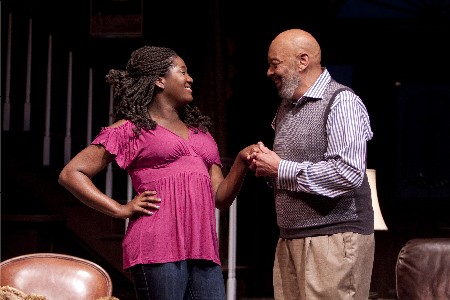
Amber Iman as Cheryl and Wendell Wright as Joe LeVay in the Huntington Theatre Company's production of Stick Fly
The play’s socio-political approach is closer to Oprah than Odets. The LeVays and visitors do their best to disguise (or to aggressively defend) their vulnerabilities. Even Joe, it turns out, sits uneasily atop the domestic pyramid. Because of their weaknesses, the inklings they have of their own bad faith, Diamond’s characters are rounded rather than squared: the playwright dramatizes the amusing connections between our strengths and weaknesses as perceived by others and ourselves. What’s more, the figures are self-consciousness enough to make fun of themselves, a self-puncturing that Odets and Parks don’t dare allow their balloon figures.
The Huntington Theatre Company (HTC) cast members generally have a heigh-ho time with the various clashing personalities and cultural perspectives, especially Nikkole Salter as Taylor, a spiky outsider who tries so hard to be liked, and Wendell W. Wright, whose Joe rises to the sardonic occasion when he asserts his narrow definition of freedom. David Gallo’s sleek set beautifully serves the needs of the play, including serving up the most wonderfully surreal library shelving I have seen on stage.
Instead of positing a bottom line diagnosis for the neediness among successful African-Americans, Stick Fly skillfully dramatizes its difficult conflicts as works-in-progress, primarily a matter for discussion and self-knowledge rather than justification for flashy proclamations of optimism or doom. Diamond’s play is a useful reminder that the stage can serve as a place for provisional insights rather than prophetic, video-sized statements.
Tagged: American, American Repertory Theater, Arena-Stage, Boston, Boston Center for the Arts, Clifford Odets, Daniel Fish, Diane Paulus, Huntington-Theatre-Company, Kenny Leon, Lydia Diamond, New York, Paradise Lost, Public Theater, stage, Stick Fly, Suzan-Lori-Parks, The Book of Grace
